In an op-ed published in The New York Times on Monday, Yuval Steinitz, Israel’s minister of intelligence argued that since “there is zero chance of reaching a satisfactory good deal before the Nov. 24 deadline,” the option of extending negotiations while keeping sanctions in place could “be regarded a qualified success.”
Observing that Iran’s position on nuclear matters has stayed consistent both under President Hassan Rouhani and his predecessor Mahmoud Ahmadinejad, and that Iran has a “track record of sponsoring terrorist groups, abusing human rights, calling for Israel’s destruction, and lying unabashedly for almost 20 years about its nuclear program,” Steinitz warns:
That’s because Iran has already made considerable progress in its attempt to advance toward nuclear weapons. An agreement that allows Iran to continue circling in a holding pattern will resemble what happened with North Korea after the 2007 agreement left large parts of Pyongyang’s nuclear capabilities intact, which enabled the North Koreans to produce several nuclear weapons in the following years. Under such conditions, nothing will stop Iran’s mullahs from landing, sooner or later, at their ultimate destination.
A deal which allows Iran to retain its enrichment capacity would also benefit Iran in other ways:
In return for an insignificant and temporary reduction of its enrichment capacities, Iran stands to reap $100 billion per year when the sanctions are lifted; gain formal legitimacy for its uranium enrichment activities; and, despite its history of nuclear fraud and concealment, preserve the capability to produce nuclear weapons at a time it deems appropriate.
Steinitz warned that allowing Iran to keep its enrichment capabilities intact would threaten to “pave the road to nuclear proliferation and herald the dawn of a nuclear arms race in the unstable Middle East, and advised that while fighting the Islamic State of Iraq and Syria (ISIS) is a worthy effort, it shouldn’t distract the West from taking a hard line with Iran in nuclear negotiations, as in the end “[t]he Islamic Republic of Iran remains the world foremost threat.”
Earlier this month Prime Minister Benjamin Netanyahu said on Face the Nation, “if you think ISIS is dangerous, and should be defeated, as I do — and I completely support President Obama’s effort, leadership in this regard — then think how much more dangerous Iran is.”
[Photo: Journeyman Pictures / YouTube ]




